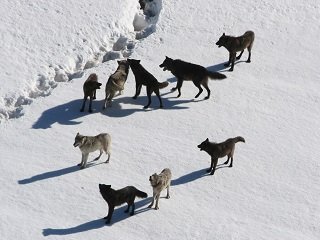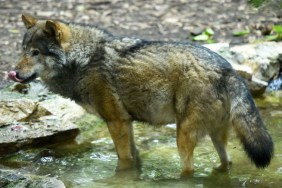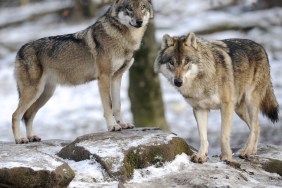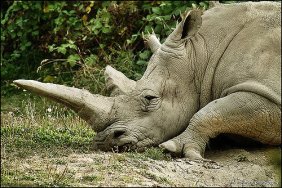 Michigan has just concluded its wolf hunt for the year. Even though the Michigan Department of Natural Resources had targeted 43 wolves for this, its first wolf hunt, only 23 animals were taken. Why you might ask weren’t more wolves taken? I’m sure the answers are complex, but I think that wolf hunting is highly controversial since people have mixed emotions about wolves.
Michigan has just concluded its wolf hunt for the year. Even though the Michigan Department of Natural Resources had targeted 43 wolves for this, its first wolf hunt, only 23 animals were taken. Why you might ask weren’t more wolves taken? I’m sure the answers are complex, but I think that wolf hunting is highly controversial since people have mixed emotions about wolves.
Since wolves capture the imagination and sympathy of the general public, it’s difficult to imagine them as only trophies or varmints that need to be put down. Yet history has proven again and again, that large wolf populations are too competitive with domestic animal production to remain uncontrolled. Seventeen of the wolves brought down in the Michigan hunt were considered “problem animals” meaning they were known killers/attackers of pets and livestock. Some were even considered ‘fearless’ meaning they weren’t intimidated by people.
Michigan DNR, as reported by AP, plans not only to reduce numbers and problem animals, but also to put that fear of man back into the wolves of the area. Wolves are large predators at the top of the food chain. They will not hesitate to kill whatever they need to eat and if that includes ranch animals, pets or people, if they aren’t intimidated they’ll do it. Wolves will eat between 5 to 15 pounds of meat a day, and if game is scarce, or it difficult to catch, wolves have been known to take the easy way out and turn to the animals that are fenced in and easy to get at.
Frank Glaser, an Alaskan hunting and trapping legend, also known as the ‘Alaskan Wolf Man’ observed that large numbers of wolves can decimate game in an area very quickly. He also noted that if game is available, that wolves also kill for sport. Since the general public seems to think that wolves won’t attack humans and that they only kill the sick and old, wolves have earned an exaggerated reputation as benevolent and friendly.
The truth is a lot grimmer. Wolves were almost wiped out not just for their pelts, but because they killed domesticated animals and competed for resources with humans. We seem to have forgotten that in our guilt about their near permanent demise and our desire to right that wrong. I also love wolves and believe they should be brought back, but we can’t continue to be ignorant about the costs.
Apparently the state of Michigan understands that turning a large predator loose demands careful controls. Their hunt shows a desire to both preserve and control wolves so that both humans and wolves can live in balanced harmony. Unfortunately, there remain people that still believe that wolves deserve to continue to be protected and are fighting both hunting, and the government’s decision to remove wolves from the protected lists in court.
What it comes down to it can humans and wolves really live together? I think they can, but since we aren’t willing to give the wolves back their habitat, then the wolves are going to have to be controlled, and that means hunting them.








